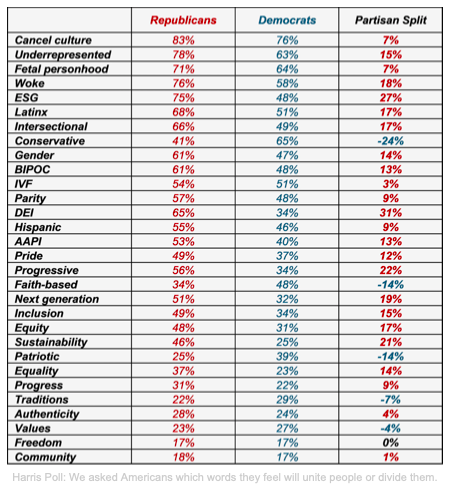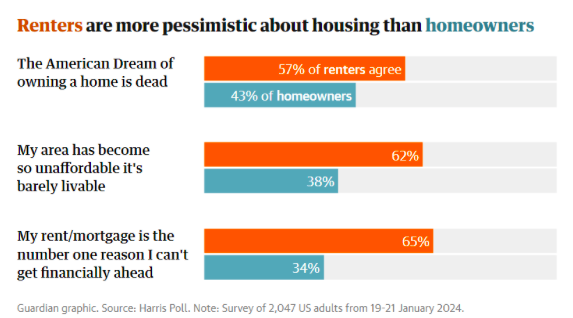Brief • 5 min Read
America This Week: Toxic Words, The Home Ownership Mirage, We Spend More on Streaming Than Gas, and The Growing News Crisis.
The latest trends in society and culture from The Harris Poll
The field is set for the general election, so if you live in Arizona, Georgia, Michigan, Nevada, Pennsylvania, or Wisconsin ––buckle up for eight months of attack ads. What matters to voters? In February, Harvard CAPS-Harris Poll, Immigration and the Economy are the top two issues. In our America This Week poll fielded March 8th to 10th, among 2,052 Americans, nearly three-quarters (73%) are still concerned about affording their living expenses (unchanged from October 2023).
This week, we have four new stories: First, our CEO John Gerzema wrote an essay in Fast Company with colleague Ray Day (the former CCO at IBM and Ford) on the most polarizing words plaguing corporate communications amid today’s political toxicity. Next, in a new Harris Poll with The Guardian, American renters express dim homeownership prospects, with the majority saying, “The American dream of owning a home is dead.” Then, in a poll with Tubi, we ask why monthly streaming services now cost more than gas! Finally, in a survey with Otherweb, Americans discuss the declining accuracy of news heading into the election.
It’s Not Just ‘Woke.’ These Are The Most Polarizing Words In America: Fast Company-Harris Poll
A picture is worth a thousand words. Yet a three-letter acronym might be even more powerful – and a growing problem for business, according to our CEO John Gerzema and Stagwell’s Vice Chair Ray Day in an op-ed in Fast Company.
- Context: A National Association of Corporate Directors Survey listed “increased political polarization” among boards’ top issues in the next 12 months.
- In fact, in a Harris Poll survey, (58%) of American workers said political polarization is a significant problem in their company today, and (79%) say it’s negatively affecting business operations.
- Toxic Wordle: All the words we showed respondents – from “cancel culture” (most divisive) to “community” (least divisive) – alienate (46%) of Americans (up 7% points from December). If you’re communicating with Republicans, “underrepresented,” “ESG,” “DEI,” and “gender” become even more problematic. Among Democrats, steer clear of “patriotic,” “faith-based,” “traditions,” and, of course, “conservative.”

- Well-meaning terms can alienate the very communities they’re meant to champion: “BIPOC” is seen as divisive by (48%) of Black and (45%) of Hispanic Americans. “Latinx” turns off (40%) of Hispanic respondents.
- With political polarization sure to become an even bigger problem during the next nine months leading up to the U.S. general election, here are five recommendations for business leaders today: 1. Avoid jargon 2. Only use the language you can defend 3. When you divide, you subtract, so look for unifying messages and causes. 4. Less is more, and 5. Never backtrack on your words or your ethics and values.
Takeaway: The lesson for business is that loose jargon and acronyms hold back progress. Notably, the acronyms are causing the issues – not the concepts themselves. In our data, while (62%) of Americans find the acronym ESG to be divisive, only (35%) say the same about sustainability. Similarly, swapping DEI (49% divisive) for equality (only 30% divisive) improves understanding and acceptance.
The American Dream of Owning a Home is Dead: The Guardian-Harris Poll
The American dream of owning your own home is dead, according to recent research from The Harris Poll Thought Leadership & Futures practice, as covered by The Guardian.
- Though the vast majority of renters (81%) polled said they want to own a home in the future, (61%) said they are worried they will never be able to.
- More renters have pessimistic outlooks on homeownership compared to their homeowning peers, such as believing the American Dream of owning a home is dead (57% v. 43%):

- Renters are even more likely to believe the return on investment in homeownership today isn’t what it used to be (v. homeowners: 56%).
- Fact, not fiction: Redfin estimates that only (16%) of home listings in 2023 were affordable to the typical U.S. household. In comparison, (50%) of listings in 2013 were affordable on a median income.
Takeaway: “When you think about Maslow’s hierarchy of needs, housing is at that foundational level of security. The implications on consumer psyche when things feel so unaffordable will impact everyone,” said Libby Rodney, Chief Strategy Officer at Harris Poll. The American dream of owning a home “looks more like a daydream for renters.”
Viewers Side Eye Streaming Prices: Tubi-Harris Poll
Your streaming habit might cost you a pretty penny, according to our latest research in partnership with Tubi, as featured by Marketing Brew.
- Americans spend an average of $119.76 monthly on streaming video services and more than $112.11 monthly on gas.
- With this high price tag, over half (53%) of Gen Z and Millennials believe they’re overspending on streaming, with (71%) canceling due to tiered memberships that force them to pay more to access certain content.
- Consumers will take ads for a discount: (58%) of viewers would rather watch ads while streaming and get an extra coffee every month than pay the total price for an ad-free service.
- Peer pressure hits screens: Half (48%) of Gen Z and Millennials feel pressure to stream current T.V. shows to stay abreast of pop culture. However, (74%) would prefer original programming to reboots or franchised content.
Takeaway: Americans’ willingness to pay streaming costs reflects their desire for escapism in a nation embroiled in the collective stress of a pandemic, an upcoming election, and lingering inflation. Previous Harris Poll research found that (87%) of Americans report watching movies and T.V. shows to escape the complexities and pressures of today’s world.
Going Into The Election, Americans Say There’s a News Crisis: Otherweb-Harris Poll
This month, big tech companies agreed to fight online election misinformation like clickbait, deepfakes, and AI-generated content. In a new survey with Otherweb, we asked Americans about the reliability of today’s news information heading into the election in MediaPost. Here’s what we found:
- Nearly nine in ten Americans (87%) feel their fellow citizens are more misinformed about political news than they were five years ago and believe things that are simply untrue (Boomers+: 92% v. Gen Z: 78%).
- Three-quarters also say it has become increasingly difficult to find factual political information (75%). They also must make more of an effort to be well-informed about political news than five years ago (74%).
- Yet while most say they should consume political news from both the right and the left, over half (54%) stick to news sources that align with their political beliefs.
Takeaway: “People want substance over sensationalism, especially in an election year,” says Alex Fink, CEO and founder of Otherweb. “The results show an interesting dynamic in which people claim to want a better way to get quality information, but they’re still only reading the outlets they align with politically.”
Subscribe for more Insights
Subscribe to our newsletter for the latest trends in business, politics, culture, and more.
Download the Data
This survey was conducted online within the U.S. by The Harris Poll from March 8th to 10th, among a nationally representative sample of 2,052 U.S. adults.
Download
Subscribe for more Insights
Subscribe to our newsletter for the latest trends in business, politics, culture, and more.
Download the Data
This survey was conducted online within the U.S. by The Harris Poll from March 8th to 10th, among a nationally representative sample of 2,052 U.S. adults.
DownloadRelated Content







